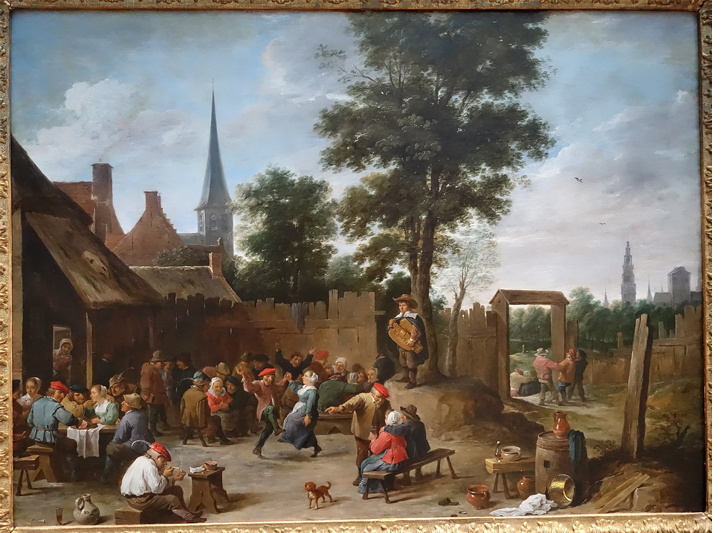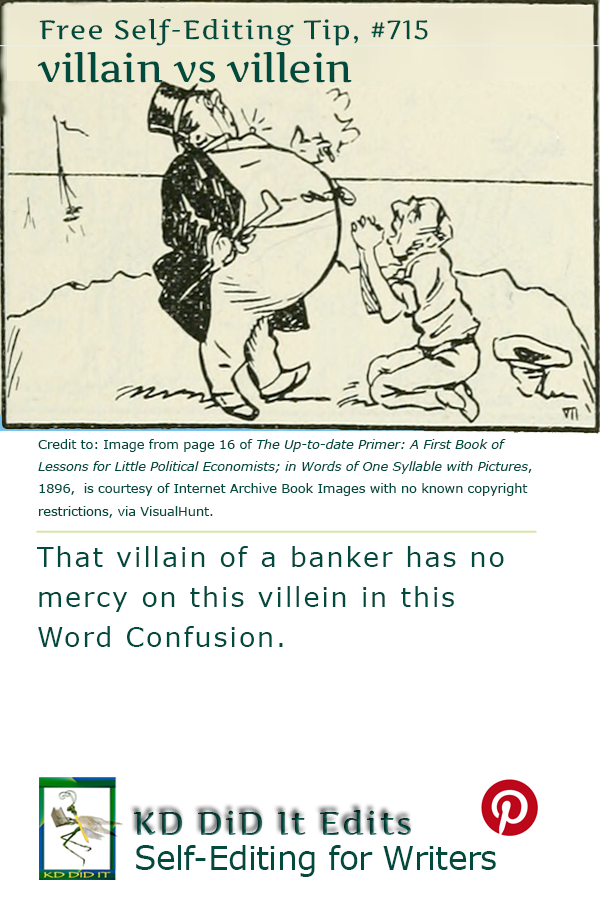Revised as of
12 Oct 2022
This word confusion is one of my own. Oh, I know the definitions for each, but I always have to check the spelling. I keep wanting to spell villain as villian. God knows why . . .!
It has helped, writing this word confusion, as it’s been in my face and both end the same, sort of, way with both ending in -in and only the a and the e making the difference. Phew . . . I sure hope I can remember this.
On a more definitive note, villain is used in a pejorative sense these days while villein hearkens back to a much older past of servitude.
Word Confusions . . .
. . . started as my way of dealing with a professional frustration with properly spelled words that were out of context in manuscripts I was editing as well as books I was reviewing. It evolved into a sharing of information with y’all. I’m hoping you’ll share with us words that have been a bête noire for you from either end.
If you found this post on “Villain versus Villein” interesting, consider tweeting it to your friends. Subscribe to KD Did It, if you’d like to track this post for future updates.
| Villain | Villein |
|---|---|

Queen and the Dwarves by Jennie Park Photography is under the CC BY 2.0 license, via VisualHunt. — The villain queen from Snow White. |

A Village Kermesse near Antwerp by David Teniers the Younger is courtesy of the National Gallery of Ireland and was photographed by Karmakolle. It’s in the public domain, via Wikimedia Commons. — Villeins at play. |
| Part of Grammar: | |
| Noun 1, 2
Plural: villains |
Noun
Plural: villeins |
[In a film, novel, or play] A character whose evil actions or motives are important to the plot 1
[Often jocular] A mischievous person
[British police slang] A criminal [Obsolete] An uncouth person
[Archaic] Variant spelling of villein 2 |
[Medieval England] A member of a class of partially free persons under the feudal system, who were serfs with respect to their lord but had the rights and privileges of freemen with respect to others |
| Examples: | |
| I have played more good guys than villains.
Snidely Whiplash was the archetypical villain. John Lawton writes spy novels in which the spies are villains, and there’s no doubt about it. A normal thriller would have a villain, ready to strike at any moment and a hero in hot pursuit of the truth that will set him or her free. The terrorists are cartoon villains. The industrialized nations are the real environmental villains. In Orwell’s novel 1984, Big Brother is the evil villain. |
The one in the sheepskin is a villein, a runaway from his master.
The advent of the Black Death was a major cause in the shift in status from villein tenure to freeman. “He aims to reassess the decline of serfdom, address lacunae in the record, address unresolved questions, and explore how different types of leaseholds and copyholds emerged out of villein tenure and shaped England’s subsequent agrarian development” (Bailey). The villein, half-slave as he was in some respects, held lands of his own which he tilled on those days of the year when his lord had no claim upon him or his oxen. |
| Derivatives: | |
| Adjective: villainous Adverb: villainously Noun: subvillain, undervillain, villainage, villainess, villainies, villainous, villainousness, villainy Verb: villainize |
Noun: villeinage |
| History of the Word: | |
|
From the Old French vilein meaning serf, which is from the Medieval Latin villanus meaning farmhand, which is itself the Late Latin vīllānus meaning worker on a country estate, which comes from the Latin villa meaning country house. |
C’mon, get it out of your system, bitch, whine, moan . . . which words are your pet peeves? Also, please note that I try to be as accurate as I can, but mistakes happen or I miss something. Email me if you find errors, so I can fix them . . . and we’ll all benefit!
Satisfy your curiosity about other Word Confusions on its homepage or more generally explore the index of self-editing posts. You may also want to explore Book Layout & Formatting Ideas, Formatting Tips, Grammar Explanations, Linguistics, Publishing Tips, the Properly Punctuated, Writing Ideas and Resources, and Working Your Website.
Resources for Villain versus Villein
Apple Dictionary.com
Bailey, Mark. The Decline of Serfdom in Late Medieval England: From Bondage to Freedom. Boydell Press, 2016. Paperback. lt;https://amzn.to/3T2fAuj> or <https://www.thefreelibrary.com/The+Decline+of+Serfdom+in+Late+Medieval+England%3A+From+Bondage+to+…-a0381332163>.
Dictionary.com: villain
The Free Dictionary: villein
Oxford Living Dictionaries: villain
Pinterest Photo Credits:
This image from page 16 of The Up-to-date Primer: A First Book of Lessons for Little Political Economists; in Words of One Syllable with Pictures, <https://visualhunt.com/f2/photo/14761583406/1aabd6748d/>, 1896, was resized to fit and is courtesy of Internet Archive Book Images with no known copyright restrictions, via VisualHunt.


